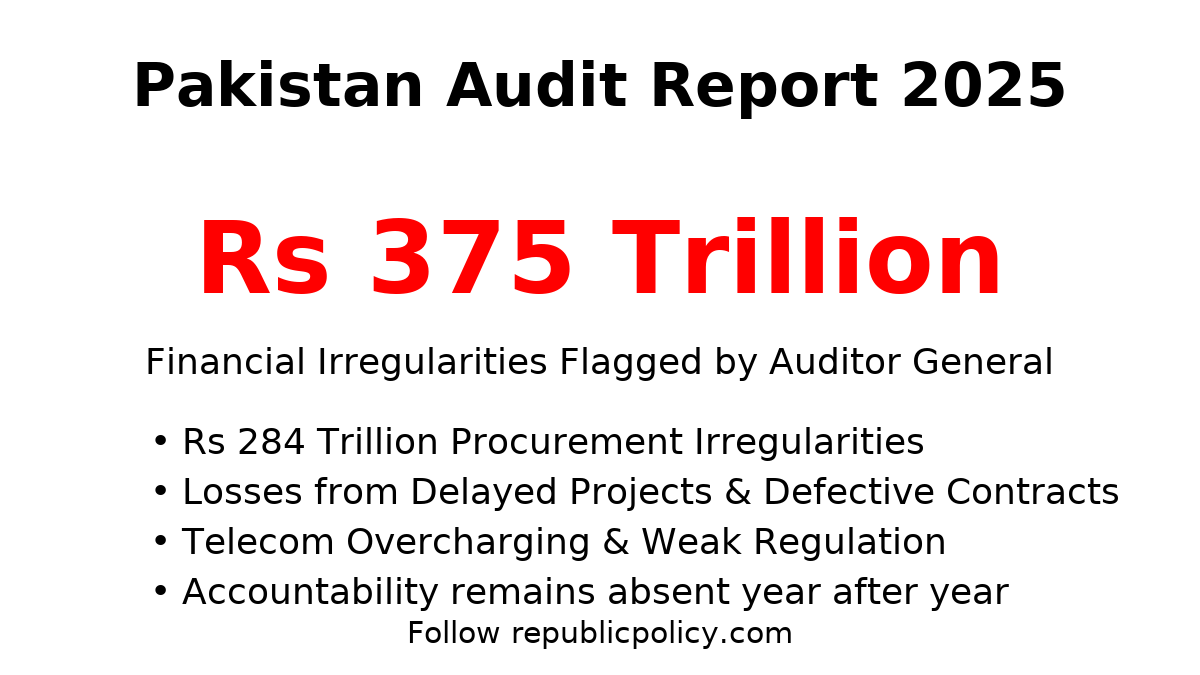Zafar Iqbal
The latest audit report released by the Auditor General of Pakistan (AGP) is more than a bureaucratic document; it is a national indictment. The numbers are staggering and the findings are damning. With Rs375 trillion in financial irregularities flagged, the report exposes not only lapses in fiscal management but also the deep structural rot within Pakistan’s governance system. Procurement-related violations amounting to Rs284 trillion, losses from delayed civil works, defective contracts, and non-recovery of dues paint a picture of a state where financial discipline is absent, accountability is weak, and public funds are routinely misused.
Follow Republic Policy Website
What emerges from the AGP’s findings is a familiar pattern: expenditures approved without parliamentary oversight, massive supplementary grants, and allocations blocked or left unused. This cycle has become emblematic of Pakistan’s fiscal dysfunction. Funds are requested without genuine need assessments, while billions remain idle or misappropriated. Such practices confirm the state’s failure to link expenditure with outcomes, turning governance into a box-ticking exercise rather than a public service mission. The result is a perpetual fiscal crisis that bleeds national resources while citizens see little in return.
Follow Republic Policy YouTube
The audit report also ventures into regulatory territories, offering a troubling view of the telecom sector. The refusal of partially privatised PTCL to permit an audit of its accounts raises questions about the erosion of state authority over public-private entities. Financial discrepancies worth Rs3.54 billion in inflated procurement, excessive operational expenses within the Special Communications Organization (SCO), and Jazz’s consumer overcharging of Rs6.58 billion in FY24 illustrate the consequences of unchecked corporate power and weak regulatory governance. The telecom regulator’s inability to resolve the Rs53.54 billion Zong spectrum case only underscores the crisis of accountability within market regulation.
Follow Republic Policy Twitter
These revelations are not isolated incidents but symptoms of a systemic malaise. Pakistan’s regulatory bodies, instead of safeguarding consumer interests, often appear complicit in advancing corporate agendas. The overcharging of millions of mobile subscribers is a blatant reminder of how regulatory inertia directly harms ordinary citizens. At the same time, weak corporate governance has already brought many state-owned enterprises to the brink of collapse. Telecom is not unique—it merely reflects the wider dysfunction in Pakistan’s governance architecture.
Follow Republic Policy Facebook
At its core, the AGP’s report exposes the absence of accountability. Audit findings, year after year, highlight financial violations, procurement anomalies, and systemic mismanagement, yet the reports are treated as annual rituals rather than calls to reform. Without strong parliamentary oversight and judicial intervention, these findings fade into irrelevance. Accountability requires more than paperwork; it requires consequences. Until state institutions are compelled to enforce compliance, audit reports will continue to gather dust while mismanagement flourishes.
Fiscal indiscipline is not merely a matter of miscalculated accounts—it has real consequences for development and welfare. Each rupee wasted through irregularities, blocked allocations, or delayed projects is a rupee denied to schools, hospitals, and social protection programs. When public money is diverted into the hands of inefficient contractors, predatory corporations, or unmonitored bureaucracies, the cost is borne by the citizen. The staggering sums cited by the AGP could transform Pakistan’s education system, rebuild infrastructure, or alleviate poverty, yet they instead expose a state captured by mismanagement.
Follow Republic Policy Website
The audit also highlights how financial misconduct undermines trust in institutions. Citizens lose confidence not only in regulators and ministries but in the state itself when their taxes are misused or when powerful corporations escape scrutiny. The perception that rules apply selectively fuels cynicism and weakens democratic legitimacy. For Pakistan, already struggling with an economic downturn and political instability, such erosion of trust is a threat to national cohesion.
Follow Republic Policy YouTube
Reform, therefore, must move beyond token gestures. First, parliamentary oversight needs to be institutionalized. No expenditure should bypass parliamentary scrutiny, and supplementary grants must be strictly regulated. Second, regulatory bodies must be insulated from corporate capture, empowered to act independently, and held accountable for negligence. Third, fiscal transparency must be enforced through digitalisation, open data, and citizen audits. Lastly, the judiciary must treat gross mismanagement and financial misconduct as crimes against the public interest, imposing penalties that deter future violations.
Follow Republic Policy Twitter
The AGP’s audit should be viewed as a mirror reflecting the state of governance. It shows a bureaucracy more concerned with procedures than performance, regulators more aligned with corporations than consumers, and political elites more interested in bypassing accountability than strengthening it. Unless systemic reforms are undertaken, the financial hemorrhage will continue unchecked. Pakistan cannot afford such waste when its economy is struggling for stability and millions live in poverty.
Follow Republic Policy Facebook
Ultimately, the audit report is a call to action. It is not enough for the Auditor General to expose; institutions must respond. Parliament must debate these findings, regulatory bodies must be restructured, and the judiciary must enforce consequences. Only then can scarce national resources be redirected towards welfare and development. Accountability, fiscal discipline, and regulatory reform are not optional—they are existential for Pakistan’s survival.
In conclusion, the AGP’s findings are not simply about numbers—they are about the future of Pakistan. Mismanagement worth trillions is not just a financial lapse; it is a national tragedy. It denies citizens their rights, undermines governance, and stalls development. Unless accountability is enforced, fiscal discipline restored, and regulatory governance strengthened, Pakistan will remain caught in a cycle of crisis. The choice is clear: either continue the ritual of neglect or embrace reforms that prioritize the people over inefficiency and corporate capture.
















